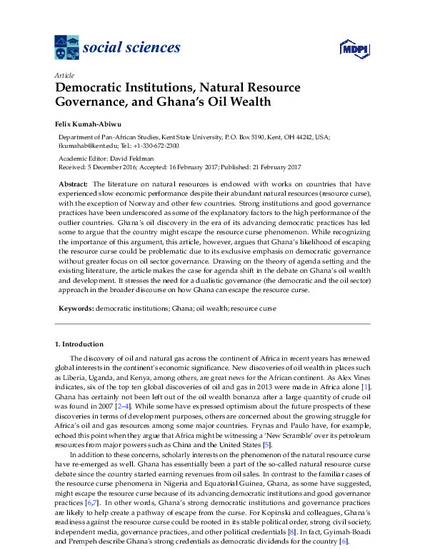
Article
Democratic Institutions, Natural Resource Governance, and Ghana's Oil Wealth
Social Sciences
(2017)
Abstract
The literature on natural resources is endowed with works on countries that have
experienced slow economic performance despite their abundant natural resources (resource curse),
with the exception of Norway and other few countries. Strong institutions and good governance
practices have been underscored as some of the explanatory factors to the high performance of the
outlier countries. Ghana’s oil discovery in the era of its advancing democratic practices has led
some to argue that the country might escape the resource curse phenomenon. While recognizing
the importance of this argument, this article, however, argues that Ghana’s likelihood of escaping
the resource curse could be problematic due to its exclusive emphasis on democratic governance
without greater focus on oil sector governance. Drawing on the theory of agenda setting and the
existing literature, the article makes the case for agenda shift in the debate on Ghana’s oil wealth
and development. It stresses the need for a dualistic governance (the democratic and the oil sector)
approach in the broader discourse on how Ghana can escape the resource curse.
Keywords
- democratic institutions; Ghana; oil wealth; resource curse
Disciplines
Publication Date
Spring February 21, 2017
DOI
10.3390/socsci6010021
Citation Information
Felix Kumah-Abiwu. "Democratic Institutions, Natural Resource Governance, and Ghana's Oil Wealth" Social Sciences Vol. 6 Iss. 1 (2017) p. 1 - 13 Available at: http://works.bepress.com/felix_kumah-abiwu/19/
Creative Commons license

This work is licensed under a Creative Commons CC_BY-NC-SA International License.
